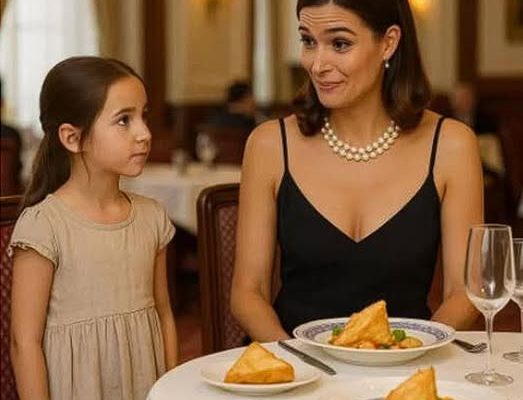One rainy November night in Madrid, the El Palacio Real restaurant was awash with warm lights and elite conversation.
At one of the most elegant tables, Carmen Vega, the iconic Spanish fashion designer, was savoring her favorite Iberian ham, staring blankly at her phone screen. She was a 32-year-old woman, owner of a haute couture empire and possessor of everything money could buy, except one thing: inner peace.
Outside, in the drizzle and cold, a 10-year-old girl in dirty, torn clothes stared at the restaurant with blue eyes clouded with hunger. Her name was Lucía, and she hadn’t eaten for three days. After mustering up her courage, she pushed open the glass door and approached Carmen, trembling.
“Excuse me, ma’am,” she whispered, “could I have what you don’t finish?”
Carmen looked up. In that little girl’s eyes, there was a deep pain, but also an innocence that reminded her of something forgotten. Something broke inside her. Without hesitation, she slid her chair aside.
“Sit next to me.”
The waiter protested, but Carmen didn’t budge. Lucía sat down cautiously and began to eat as if it were the first meal of her life. Between bites, she told her story: her parents had died when she was eight, she was sent to a foster family who mistreated her, and she finally ran away when her adoptive father made a move on her. Since then, she had been living on the streets of Madrid.
Carmen listened with a lump in her throat. That little girl didn’t just need food; she needed love, dignity, and a home. She decided to take her to her penthouse in Chamberí. She prepared a hot bath, clean clothes, and a bed with silk sheets. But beyond the material things, she offered her something no one else had ever given her: respect.
That night, Lucía asked, “Why are you helping me?”
Carmen stared at the ceiling before answering.
“Because when I was your age, I needed someone to help me, too.”
Lucía blinked. Carmen had always looked so polished in the media—flawless makeup, high fashion, bodyguards. It never occurred to her that someone like Carmen had ever known pain.
“My mother left when I was seven. My dad drank. A lot,” Carmen said softly. “We lived in a tiny flat in Valencia. I used to steal apples from the market just to feed my little brother.”
Lucía listened, eyes wide.
“One night,” Carmen continued, “my father didn’t come home. He had been hit by a car. I remember staring at the police officers, thinking they were lying.”
She paused, taking a deep breath.
“After that, we were separated. My brother was adopted by a family in Germany. I was sent to a group home. And nobody ever came for me.”
Lucía’s voice was barely audible. “Did you ever see your brother again?”
Carmen shook her head. “No. I tried to find him. But I was just a kid with no money and no idea how the world worked.”
The silence between them was soft but heavy.
“But I made a promise to myself,” Carmen added. “If I ever had enough, I’d make sure no kid around me would feel like I did.”
Lucía stared down at her plate, now empty, and whispered, “Thank you.”
In the weeks that followed, Carmen took real steps—not just charity, but responsibility. She hired a child psychologist, started homeschooling Lucía through a private program, and eventually applied for legal guardianship.
Her assistant, Maribel, was skeptical at first. “Are you sure this isn’t… emotional? Spur of the moment?”
“Everything important in my life started with emotion,” Carmen replied. “My brand, my designs—hell, even leaving home. Why should this be any different?”
Lucía slowly blossomed. She was sharp, sarcastic, and fiercely observant. She didn’t trust easily, and she didn’t smile much. But she learned quickly—math, English, French, and even a bit of sewing from Carmen herself.
One day, Carmen came home early and found Lucía sketching dresses on the back of old magazines.
“These are yours?” she asked.
Lucía nodded shyly. “They’re not very good…”
“They’re better than what some interns submit after fashion school,” Carmen said, half-laughing.
The girl lit up. Just a flicker. But it was there.
Things weren’t perfect. Lucía still had nightmares. Some nights she locked herself in the bathroom and cried for hours. Carmen never pushed. She just waited outside the door and said the same thing each time: “When you’re ready. I’m here.”
Then, about eight months after Lucía moved in, something strange happened.
A man in his 40s showed up at Carmen’s office. His name was Rafael, and he claimed to be Lucía’s uncle—her mother’s brother. He’d been living in Brazil, only recently found out what happened, and wanted custody.
Carmen was stunned. “Why now?”
“I didn’t know she was alive,” he insisted. “I came across her name in a missing persons database. I can prove who I am.”
And he did. Birth records, family photos, even a video of Lucía’s mother singing lullabies when she was pregnant.
Legally, he had a case. Blood relation often outweighed non-blood guardianship, especially if he could prove he was stable. Carmen was furious but careful not to show it.
Lucía, meanwhile, didn’t trust him. “Where was he when I was sleeping in train stations? Where was he when they took me away from my parents’ funeral like trash?”
Carmen knelt down. “You don’t have to go with him. We’ll fight it. But if you ever want to meet him… just to ask your own questions… that’s okay, too.”
Lucía met him once, in a supervised meeting. She sat across the table, arms crossed, face unreadable.
“Do you even know my birthday?” she asked.
Rafael stammered. “August 14th?”
“Wrong. It’s the 12th. You don’t know me. Don’t pretend.”
The court battle took three months. Rafael painted Carmen as an attention-seeking fashionista using a homeless girl as a PR stunt. Carmen didn’t flinch. She had character references, school reports, psychological evaluations—all showing how Lucía had thrived.
But the twist came when Lucía asked to speak to the judge herself.
“I know I’m only 11,” she said, standing on her tiptoes to reach the microphone. “But I’m not property. I’m not a handbag you hand off. I don’t want to live with that man. He’s a stranger. Carmen isn’t.”
The judge granted permanent guardianship to Carmen. And as they left the courtroom, Carmen whispered, “You did that.”
Lucía smiled for the first time in months. “We did.”
Years passed. Carmen let Lucía grow at her own pace. By 17, she had already interned in Carmen’s design studio and presented a capsule collection at Madrid Fashion Week under the label “LV”—not for Louis Vuitton, but Lucía Vega.
The crowd was blown away. Her designs were raw but powerful. Street-meets-couture. Grit with grace.
An American investor offered her a scholarship to study at Parsons in New York. Lucía turned it down.
“I want to build here. In Madrid. Like you did.”
Carmen beamed.
Then came the day Lucía asked if they could visit her parents’ grave. They drove out to the small cemetery on the edge of Zaragoza. The headstones were worn, the grass overgrown. Lucía placed a small bouquet of white wildflowers.
“I forgive you,” she whispered. “But I’m not broken anymore.”
On the ride home, she was quiet. Then she said, “I want to start something. Like… a foundation. For kids who ran away. Who’ve been through hell and think no one sees them.”
Carmen said nothing for a moment. Then nodded. “Let’s build it.”
And they did. The “Still Here” Foundation opened the following year. It offered shelter, therapy, education, and vocational training for homeless and abused girls across Spain.
Lucía became its face. Not because she was perfect—but because she was living proof that broken beginnings don’t define your ending.
One night, after a gala event, Lucía stood in the kitchen in sweats, eating toast. Carmen joined her.
“Still hungry?” she teased.
Lucía grinned. “Always.”
Then her smile faded into something more serious.
“Remember that night… at the restaurant?”
“Of course.”
“I used to think I was just lucky. But now I think… maybe I saved you too.”
Carmen blinked, caught off guard. But she nodded.
“You did.”
Because sometimes, the ones we rescue turn out to be our rescue.
If this touched you, please like and share. You never know who’s watching, hungry for hope.



